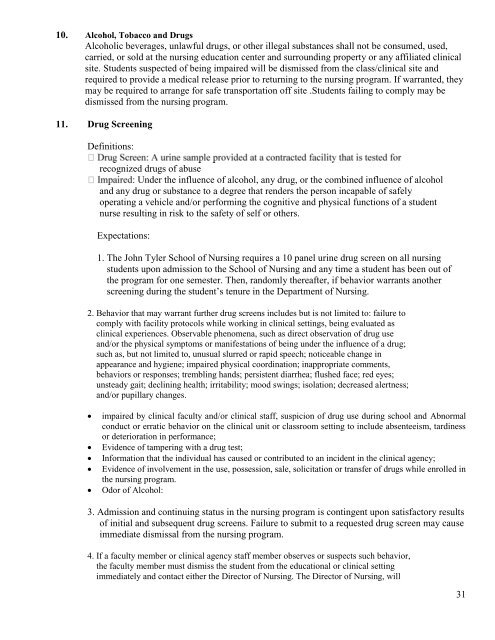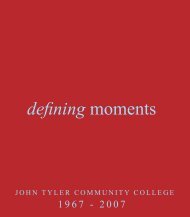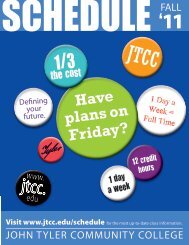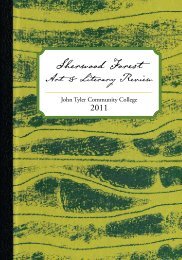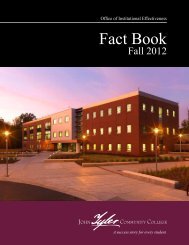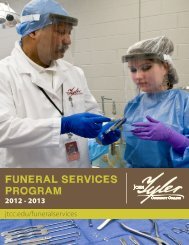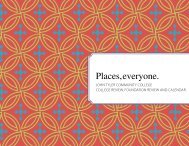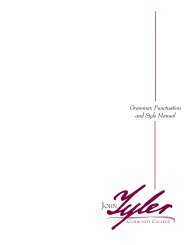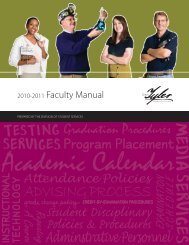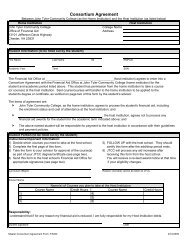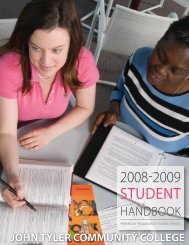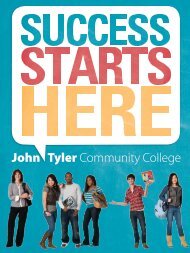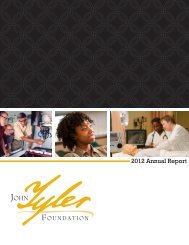Nursing Student Handbook - John Tyler Community College
Nursing Student Handbook - John Tyler Community College
Nursing Student Handbook - John Tyler Community College
Create successful ePaper yourself
Turn your PDF publications into a flip-book with our unique Google optimized e-Paper software.
10. Alcohol, Tobacco and Drugs<br />
Alcoholic beverages, unlawful drugs, or other illegal substances shall not be consumed, used,<br />
carried, or sold at the nursing education center and surrounding property or any affiliated clinical<br />
site. <strong>Student</strong>s suspected of being impaired will be dismissed from the class/clinical site and<br />
required to provide a medical release prior to returning to the nursing program. If warranted, they<br />
may be required to arrange for safe transportation off site .<strong>Student</strong>s failing to comply may be<br />
dismissed from the nursing program.<br />
11. Drug Screening<br />
Definitions:<br />
recognized drugs of abuse<br />
: Under the influence of alcohol, any drug, or the combined influence of alcohol<br />
and any drug or substance to a degree that renders the person incapable of safely<br />
operating a vehicle and/or performing the cognitive and physical functions of a student<br />
nurse resulting in risk to the safety of self or others.<br />
Expectations:<br />
1. The <strong>John</strong> <strong>Tyler</strong> School of <strong>Nursing</strong> requires a 10 panel urine drug screen on all nursing<br />
students upon admission to the School of <strong>Nursing</strong> and any time a student has been out of<br />
the program for one semester. Then, randomly thereafter, if behavior warrants another<br />
screening during the student’s tenure in the Department of <strong>Nursing</strong>.<br />
2. Behavior that may warrant further drug screens includes but is not limited to: failure to<br />
comply with facility protocols while working in clinical settings, being evaluated as<br />
clinical experiences. Observable phenomena, such as direct observation of drug use<br />
and/or the physical symptoms or manifestations of being under the influence of a drug;<br />
such as, but not limited to, unusual slurred or rapid speech; noticeable change in<br />
appearance and hygiene; impaired physical coordination; inappropriate comments,<br />
behaviors or responses; trembling hands; persistent diarrhea; flushed face; red eyes;<br />
unsteady gait; declining health; irritability; mood swings; isolation; decreased alertness;<br />
and/or pupillary changes.<br />
<br />
<br />
<br />
<br />
<br />
impaired by clinical faculty and/or clinical staff, suspicion of drug use during school and Abnormal<br />
conduct or erratic behavior on the clinical unit or classroom setting to include absenteeism, tardiness<br />
or deterioration in performance;<br />
Evidence of tampering with a drug test;<br />
Information that the individual has caused or contributed to an incident in the clinical agency;<br />
Evidence of involvement in the use, possession, sale, solicitation or transfer of drugs while enrolled in<br />
the nursing program.<br />
Odor of Alcohol:<br />
3. Admission and continuing status in the nursing program is contingent upon satisfactory results<br />
of initial and subsequent drug screens. Failure to submit to a requested drug screen may cause<br />
immediate dismissal from the nursing program.<br />
4. If a faculty member or clinical agency staff member observes or suspects such behavior,<br />
the faculty member must dismiss the student from the educational or clinical setting<br />
immediately and contact either the Director of <strong>Nursing</strong>. The Director of <strong>Nursing</strong>, will<br />
31


